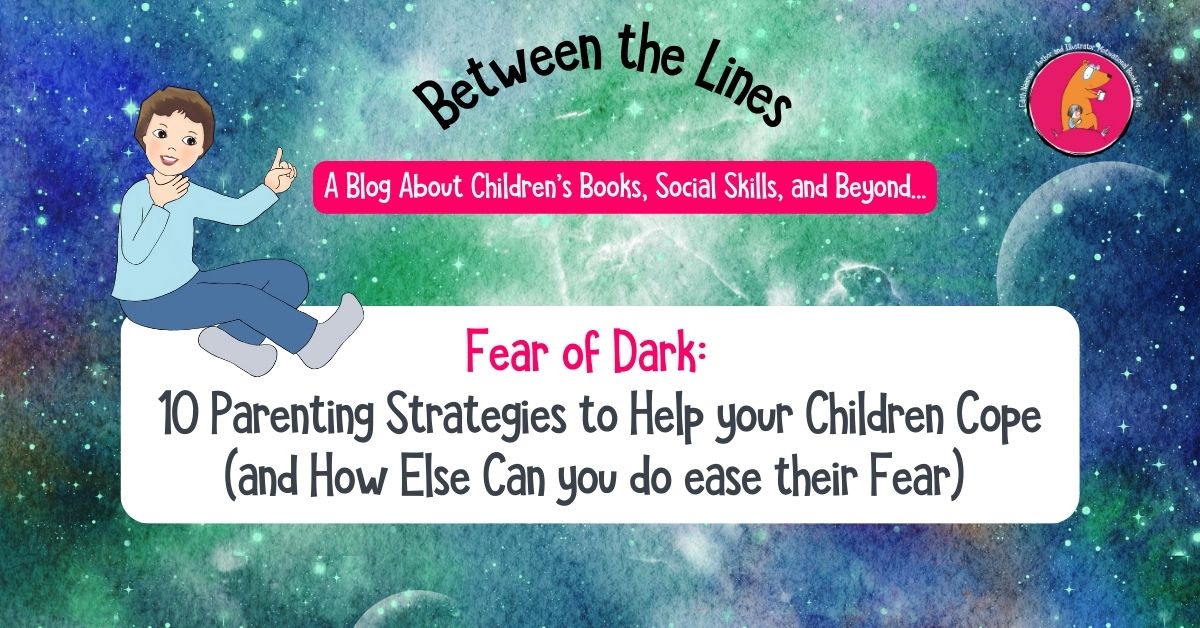Fear of dark is a common childhood experience, usually developing between ages 2-4. It stems from children’s vivid imaginations, but it’s also culturally influenced, as many monster and demon stories throughout history take place in the dark. Sounds familiar? Does your home fill with scary creatures hiding under the bed or in the closet when night falls? And what do you do about it?
As parents, it’s important to take these fears seriously and respond with empathy. This article will equip you with 10 parenting strategies to help your children cope with their fear. Read, apply, and share.
There are many ways to deal with the fear of the dark. Remember that every child is different, and what works for one may not work for another. Adapt the right strategies to your children’s personality and needs, and be patient, loving, and supportive. Over time, most children will learn to overcome their fears and develop stronger self-confidence.
Reduce Their Fear of Dark with a Calm Environment
- Create a relaxing bedtime routine together with your children
Build a regular ritual that will help your children prepare for sleep. Start with a light dinner, move on to a soothing bath, and after brushing teeth and putting on pajamas, end the day by reading a story or having a quiet chat about the day that passed. Routine and repetition create a sense of security and allow the body and mind to prepare for a peaceful night’s sleep. - Stay with them if they have trouble falling asleep alone
Even after a calming bedtime routine, some children still struggle to fall asleep alone. If you recognize this need, simply stay with them and be physically and emotionally present. Sit by their bed, offer a soothing touch, and listen to them. Encourage them to talk about what’s bothering them, repeat what they say to show you’ve listened and understood, and allow them to suggest and imagine solutions that might help. Your presence and listening will provide them with security and allow them to relax and fall asleep with you by their side. - Listen together to the sounds of the night
Turn the darkness into an opportunity for an interesting sensory experience. Sit quietly together and listen to the night sounds. Identify familiar sounds together – maybe the chirping of a night bird, the rustle of leaves in the wind, or the distant hum of a car. Explain to them that darkness sharpens our sense of hearing and allows us to hear things we didn’t notice during the day. - Invite them to snuggle in bed
Help your children create a physical “security envelope” to wrap around them. Choose together an extra soft blanket, a favorite pillow, or a cuddly teddy bear. Encourage the children to feel the pleasant textures, hug the teddy bear, and snuggle in the blanket. Talk about how these objects can “protect” them at night and remind them they are safe and loved. - End the day by reading an empowering book together
Choose a book that will help your children replace their fear of the dark with a positive, supportive experience. Emphasize the positive messages of the story and encourage the children to imagine themselves in the role of heroes who face challenges and overcome them. Reading together, especially reading a story with rhyme and repetitive rhythm, creates attention and interest in children and leads them to sleep with ease and in a pleasant atmosphere.
Reduce Their Fear of Dark Using NLP Techniques and Guided Imagery
- Invite them to color the darkness in a vivid color
As adults, we can help children use their imagination when something scares them, to see the world from a different perspective. For example, think of darkness as a color. When you think of darkness as a color – its meaning changes, and you can imagine it not only in the black associated with darkness, but in other, less threatening colors. Help your children imagine darkness in soothing and beloved colors. If they like blue, for example, suggest they think of darkness as a soft blue blanket wrapping the room. This will give children control over the situation and empower them. - Suggest they see fear as a gift
After expanding your children’s perspective and leading them to imagine the black and threatening darkness in brighter and less frightening colors, you can allow them to see the feeling of fear in a more positive light, and explain to them that fear has an important role, and that it’s actually a “gift” we received when we were born, designed to protect us from dangers. For example: If they’re climbing a high slide and they feel scared by the height – they’ll likely slow down, hold on tighter to the ladder, and concentrate more on what they’re doing, because fear will signal them to pay more attention and act with caution. - Teach them to breathe empowering and calming breaths
Now that they understand that fear is a gift meant to protect them, teach them to breathe deeply, imagine they’re taking the fear in with the air, and then exhale it forcefully, filling themselves with strength. For instance, when preparing to climb the high slide, they can breathe in the fear they feel, then exhale it forcefully and fill themselves with more attention, caution, and judgment. The ability to act against fear by choice – will help them regain control over the fear and convert it into less frightening and more beneficial choices. - Take them on a soothing journey with positive guided imagery
Help children create a mental picture of a safe and pleasant place. Put soothing music in the background, speak slowly and in a pleasant tone, and invite them to take an enormous yawn, take another deep breath, and release the air slowly. Guide them to hug their pillow or teddy bear and imagine themselves in a pleasant place… maybe at their favorite playground. Maybe on the beach with cool waves on a bright summer day… Then lead them with soft and inviting words to allow themselves to be part of this pleasant place, and reflect to them how the enjoyment and calmness they feel when they’re there leads them straight to peaceful and sweet sleep. - Lead them to sleep with a soothing lullaby
If they’re still not asleep, sing them a familiar and beloved lullaby that will lead them to blessed sleep. When my daughter was a baby, I used to sing to her the first verse of “La chanson des vieux amants” by Jacques Brel, and the wonderful chorus, which said: ”
Mais mon amour
Mon doux, mon tendre, mon merveilleux amour
De l’aube claire jusqu’à la fin du jour
Je t’aime encore tu sais
Je t’aime…”
And sometimes, if we parted and she still felt she needed a bit more of the song, she would stand up in her crib and call out “Mommy, please… mon amour…”
You don’t need to be opera singers to sing your children a lullaby. Your voice will convey a positive and soothing emotional message and cover them with a blanket of love that will wrap them throughout the night.
Bottom Line
Fear of dark is a common childhood experience, usually developing between ages 2-4. It stems from children’s vivid imaginations, but even when the fear originates in imagination, the feeling of fear is very real and it’s important to take it seriously and with empathy.
As you could have learned from the article, there are quite a few parenting strategies you can implement to help your children cope with dark fear and find solutions that will allow them to fall asleep calmly and peacefully: End each evening with a sleep routine that will help the body and mind prepare for a peaceful night’s sleep, listen together to the night sounds, use NLP techniques and guided imagery to allow them to reduce the threatening feeling of the fear, and end with a supportive experience with an empowering and positive story where they can imagine themselves in the role of heroes.
“The Scary Lion That Growled in the Dark”
Fear of dark and the scary lion that accompanies it, along with a surprising way of coping using an innovative NLP technique that has already worked wonders for many children, are the milestones in Ron’s journey to discover the secret of the scary lion that growled by his bed at night.
The book is the second in the “Little Heroes” series, which gives readers a glimpse into important life skills, lightly and combined with eye-opening illustrations, precise rhyming, and a melodic rhythm.
This is an empowering book about fear, courage, and imagination that will equip your children with a surprising technique for dealing with nightmares and anxieties, and will allow them to befriend the fears hidden in their hearts with a smile.
Now It’s Your Turn
Liked it? Share the article with friends.
Want to strengthen your children’s ability to cope with fears, nightmares, worries and anxieties successfully?
Click the pink button now and purchase for them the book “The Scary Lion That Growled in the Dark”.

